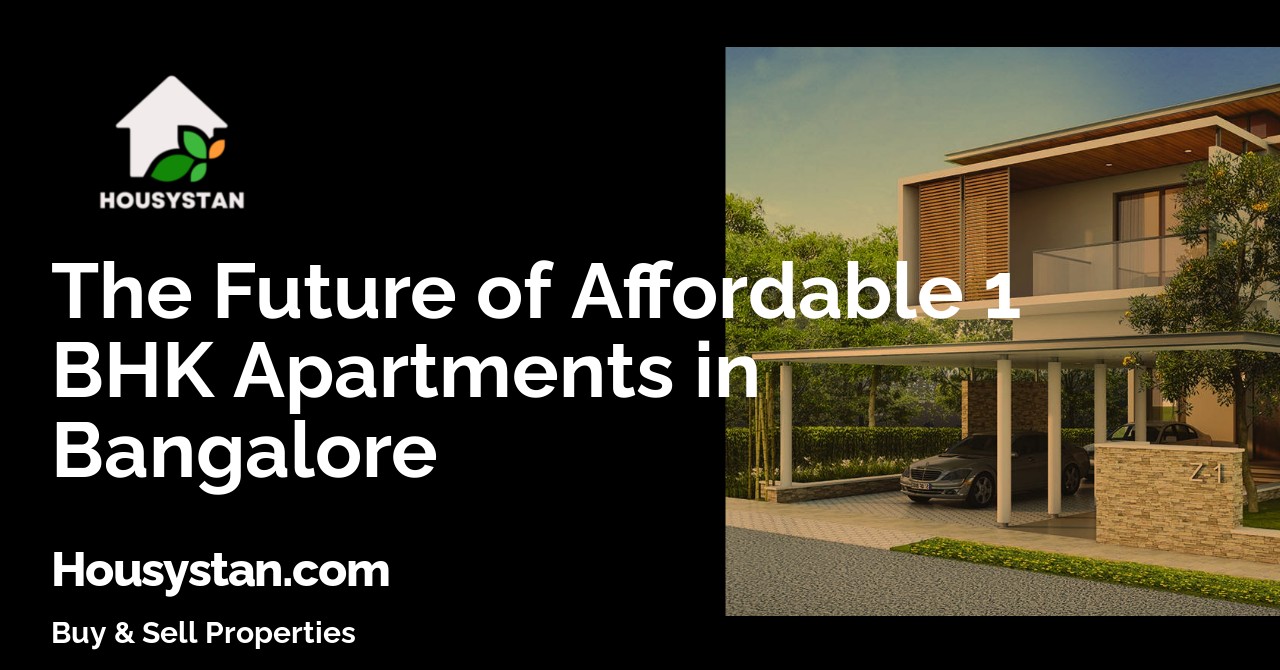The Future of Affordable 1 BHK Apartments in Bangalore
Read latest blogs and articles from Housystan

The Information mentioned here was last updated on:
29/1/2026The Future of Affordable 1 BHK Apartments in Bangalore
Bangalore, often called the Silicon Valley of India, has evolved dramatically over the past few decades. With its bustling tech industry and vibrant culture, it's no surprise that more and more people are choosing to call this city home. However, with the increasing population comes a growing demand for affordable housing, particularly for young professionals and small families. Among the most sought-after options are 1 BHK (one-bedroom, hall, kitchen) apartments. Let's explore the future of affordable 1 BHK apartments in Bangalore, focusing on the trends, challenges, and opportunities.
The Rising Demand for 1 BHK Apartments
- Verified Tenants/Buyers
- Unlimited Property Listing
- Zero subscription/charges fee
The demand for 1 BHK apartments in Bangalore is driven by several factors. One significant factor is the influx of young professionals and students moving to the city for career and educational opportunities. These individuals often prefer smaller, more affordable apartments that offer easy maintenance and budget-friendly living. Additionally, the city's dynamic lifestyle and vibrant job market attract newly married couples and small families looking for a convenient and cost-effective housing solution.
Impact of Urbanization on Housing
Urbanization has significantly influenced housing trends in Bangalore. As the city continues to expand, land prices have soared, making it increasingly challenging to find affordable housing options. Developers are keen to cater to the growing urban population, and 1 BHK apartments have become an attractive option for both buyers and investors. These apartments maximize space efficiency and offer an entry point into the real estate market for many first-time homebuyers.
Government Initiatives and Policies
The Indian government has introduced various policies and incentives to promote affordable housing across cities, including Bangalore. Programs like the Pradhan Mantri Awas Yojana (PMAY) aim to provide housing for all by offering subsidies for affordable homes. Such initiatives encourage developers to construct more budget-friendly residential projects, including 1 BHK apartments. Additionally, the government's focus on improving urban infrastructure, such as expanding metro lines and roads, enhances the accessibility of these housing developments.
Developers' Strategies for Affordable Housing
Many real estate developers in Bangalore are shifting their focus towards affordable housing projects, recognizing the growing demand for 1 BHK apartments. They employ innovative construction techniques and efficient design layouts to minimize costs while maximizing space. Modular construction and pre-fabricated materials are some of the methods used to maintain affordability without compromising quality. Additionally, developers are increasingly incorporating sustainable practices, such as rainwater harvesting and solar panels, to appeal to environmentally conscious buyers.
Technological Advancements in Real Estate
Technology is playing a crucial role in the evolution of the real estate industry. From virtual property tours to online booking platforms, technology makes it easier for buyers to explore and invest in properties remotely. For 1 BHK apartments, tech-driven solutions streamline the buying process and offer transparency, allowing potential buyers to make informed decisions. Moreover, smart home technology is becoming more accessible, enabling residents to enjoy modern conveniences and efficient energy management within their budget-friendly homes.
Location Preferences and Connectivity
When it comes to choosing a 1 BHK apartment in Bangalore, location is a key consideration. Areas well-connected to the city's IT hubs, educational institutions, hospitals, and shopping centers are highly sought after. Neighborhoods such as Whitefield, Electronic City, and Sarjapur Road are popular due to their proximity to major employment centers. Good connectivity through public transport, including the metro, ensures that residents can easily commute to work and access essential services, enhancing the overall appeal of these areas.
Future Trends in Affordable Housing
The future of affordable 1 BHK apartments in Bangalore looks promising, with several emerging trends shaping the market. Co-living spaces are gaining popularity among solo professionals and students, offering community living with shared amenities at lower costs. Additionally, as remote work becomes more prevalent, there is an increasing preference for homes with dedicated workspaces, allowing residents to balance work and personal life effectively. Developers are also focusing on creating integrated townships that offer a holistic living experience with access to retail, healthcare, and recreational facilities.
Challenges and Solutions
Despite the positive trends, developers face challenges in providing genuinely affordable housing in Bangalore. Rising land costs, regulatory hurdles, and construction delays can all impact pricing and availability. However, collaborative efforts between the government, developers, and financial institutions can help overcome these obstacles. Streamlined approval processes, affordable financing options, and tax incentives for affordable housing projects can encourage more significant investments in 1 BHK apartments.
The Role of Rental Markets
The rental market for 1 BHK apartments is also a crucial component of Bangalore's housing ecosystem. Many young professionals and students prefer renting due to its flexibility and lower initial investment compared to purchasing a home. As the demand for rental properties rises, landlords and property management companies are focusing on providing well-maintained, affordable rental options to attract long-term tenants. Rent control regulations and tenant protection laws can further stabilize the rental market, ensuring fair practices and affordable rates.
Sustainable Living in Compact Spaces
As the demand for affordable 1 BHK apartments grows, there's an increasing emphasis on sustainability and eco-friendly living. Developers are exploring innovative solutions to incorporate green spaces, energy-efficient designs, and waste management systems within compact living environments. These efforts not only appeal to environmentally conscious buyers but also contribute to reducing the city's carbon footprint and promoting a healthier lifestyle for residents.
Conclusion
In conclusion, the future of affordable 1 BHK apartments in Bangalore is shaped by various forces, including urbanization, government policies, technological advancements, and shifting consumer preferences. By addressing challenges and leveraging opportunities, Bangalore can continue to develop efficient, cost-effective housing solutions that cater to its diverse population. As the city evolves, the emphasis on affordability, connectivity, and sustainability will remain at the forefront, ensuring that Bangalore remains an attractive destination for homebuyers and tenants alike.